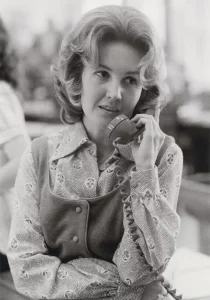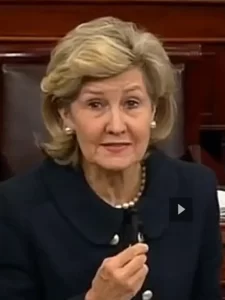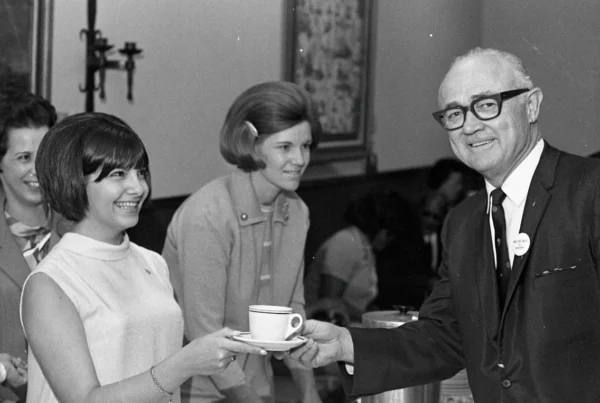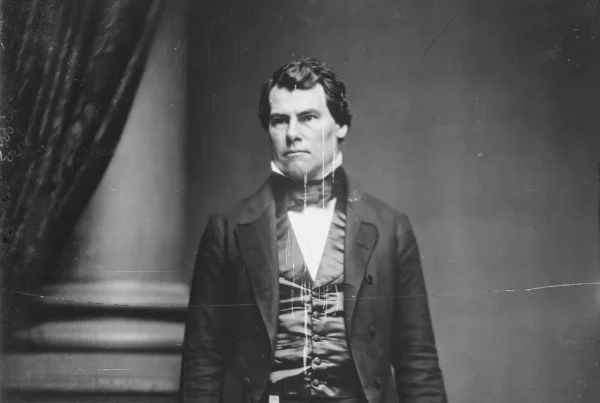Kay Bailey Hutchison (born Kathryn Ann Bailey; July 22, 1943) served as United States Senator from Texas from 1993 to 2013, becoming the first woman to represent Texas in the Senate and one of the longest-serving female senators in U.S. history. Before her Senate tenure, she served two terms in the Texas House of Representatives and as the state’s elected treasurer.
She later returned to public service as United States Ambassador to the North Atlantic Treaty Organization (NATO) from 2017 to 2021. A Republican Internationalist closely identified with the Bush-era GOP, Hutchison combined a pragmatic, business-friendly conservatism with strong support for U.S. engagement overseas. She aligned with the party’s pro-defense, free trade, hawkish wing — a stance critics often labeled as neoconservative. Her career bridged the institutionalist Republican ascendancy of the late 20th century with the more combative, populist, and isolationist styles that reshaped the party in the 2010s and 2020s.
Early Life and Education
Hutchison was born in Galveston and raised in La Marque, Texas, the daughter of Kathryn Ella Sharp and Allan Abner Bailey Jr., an insurance agent. She attended local public schools before enrolling at the University of Texas at Austin, earning a Bachelor of Arts degree in 1962 at the unusually young age of 19. She was active in student organizations and a member of Pi Beta Phi sorority. Hutchison went on to earn her Juris Doctor from the University of Texas School of Law in 1967, entering a legal profession where women were still a small minority.
After graduation, she became one of the first on-air female legal and political correspondents in Texas television, working for KPRC-TV in Houston under veteran broadcaster Ray Miller. The role gave her statewide visibility and a grounding in issues that would define her later political career.
Texas House of Representatives (1973–1976)
In 1972, Hutchison won election as a Republican to the Texas House of Representatives from the 90th District, covering a portion of Houston. The early 1970s legislature was still overwhelmingly Democratic, making her part of a small Republican caucus navigating the early stages of the state’s partisan shift.

During her two terms, Hutchison worked on legislation related to transportation safety, economic development, and government efficiency. Colleagues noted her diligence in committee work and her ability to negotiate across party lines, a necessity for minority-party legislators in that era.
Her interest in transportation and infrastructure policy led to her 1976 appointment by President Gerald Ford as Vice Chairman of the National Transportation Safety Board (NTSB), where she served a two-year term overseeing investigations and safety recommendations for air, rail, and highway systems nationwide.
Private Sector Career (1978–1990)
After her term at the NTSB, Hutchison entered the banking industry, joining Republic Bank Corporation—then the largest bank holding company in Texas—as Senior Vice President and General Counsel. She also practiced law privately and engaged in business ventures. This period broadened her expertise in finance, regulatory compliance, and corporate governance, skills she later carried into statewide office.
State Treasurer (1991–1993)
In 1990, Hutchison returned to elective politics, winning the race for Texas State Treasurer. She succeeded Ann Richards, who had been elected governor, marking a partisan shift in the office from Democrat to Republican. At the time, the Treasurer was responsible for managing the state’s cash flow, investments, and short-term debt—a significant fiscal role later abolished in 1996.
Hutchison used the position to campaign against the creation of a state income tax and advocated for statutory restrictions on state debt to ensure long-term fiscal stability. She also implemented modernization measures in cash management systems, increasing efficiency and transparency. In recognition of her expertise, President George H. W. Bush appointed her to the U.S. Transportation Infrastructure Advisory Commission, which issued recommendations to Congress in 1991.
Path to the U.S. Senate
When U.S. Senator Lloyd Bentsen resigned in January 1993 to become Secretary of the Treasury, Governor Ann Richards appointed Democrat Bob Krueger to fill the seat temporarily. Hutchison entered the special election to serve the remainder of the term, emerging as the leading Republican in a crowded field. She defeated Krueger in the June 1993 runoff with 67 percent of the vote, becoming the first woman to represent Texas in the U.S. Senate.
Her early months in office were marked by controversy when she was indicted on charges of official misconduct from her time as State Treasurer. The prosecution declined to present its case after the trial judge questioned key evidence, leading to her acquittal. Hutchison maintained that the charges were politically motivated.
Senate Career (1993–2013)
Hutchison was re-elected to full terms in 1994, 2000, and 2006, each time by wide margins. Over two decades in the Senate, she built seniority and influence, serving in Republican leadership as Vice Chair of the Senate Republican Conference, Republican Conference Secretary, and later Chair of the Republican Policy Committee.

Her committee assignments reflected both national and Texas priorities. She was Ranking Member of the Commerce, Science, and Transportation Committee, chaired the Military Construction Subcommittee of Appropriations, and served on Armed Services, Banking, and Veterans’ Affairs. She was twice elected Chair of the Board of Visitors at the U.S. Military Academy at West Point.
A consistent advocate for defense spending, Hutchison secured funding for Texas military installations and championed the Johnson Space Center and NASA’s human spaceflight programs. She supported transportation and port infrastructure projects and was known for her effective use of earmarks to direct federal resources to Texas.
On social issues, Hutchison had a complex record. She was initially identified as pro-choice but supported restrictions on abortion and later described herself as pro-life, while opposing efforts to overturn Roe v. Wade for much of her career. She also broke with her party at times, such as voting for embryonic stem cell research funding and against certain procedural efforts to block health care legislation, though she opposed the Affordable Care Act itself.
Her foreign policy positions aligned with a strong U.S. global presence and robust alliances, themes that foreshadowed her later NATO role.
Relationship to the Bush Family
Hutchison’s political career was closely intertwined with the Bush family’s network in both Texas and Washington. Her appointment by President George H. W. Bush to the U.S. Transportation Infrastructure Advisory Commission reflected their shared policy outlook. Her political ascent also paralleled that of George W. Bush: in 1994, she won a full Senate term while he was elected Governor of Texas, each becoming a central figure in the state’s Republican rise.

During George W. Bush’s two terms as president, Hutchison was a consistent ally on defense appropriations, homeland security initiatives, and NASA funding, all of which had direct significance for Texas. She supported the administration’s military and foreign policy priorities, including the wars in Afghanistan and Iraq, while using her Senate influence to direct federal resources to Texas military installations and space programs. She was also a friend of First Lady Laura Bush.
In the 2010 Republican gubernatorial primary, former President George H. W. Bush and former First Lady Barbara Bush endorsed Hutchison over incumbent Governor Rick Perry, a move that underscored their long friendship. At the time, H.W. was in his mid-eighties, largely retired from politics, and such primary endorsements from either Bush were rare. Bush described her as “a Lone Star Republican before it was cool to be a Republican in Texas” and praised her as an “effective leader” with “a loyal dedication to the Republican Party.”
2010 Gubernatorial Election
In 2009, Hutchison entered the Republican gubernatorial primary against incumbent Rick Perry, presenting herself as a pragmatic conservative with a record of statewide service. She argued that Texas needed a leader who would emphasize fiscal discipline, long-term infrastructure planning, and a cooperative approach to governance.
Perry, running for a third full term, positioned himself as the defender of Texas’s conservative identity and tapped into an electorate increasingly influenced by the populist tone of the emerging Tea Party movement. In the March 2010 primary, Perry won with 53% to Hutchison’s 31%, a decisive result that reflected the Texas GOP’s movement away from the Bush-era establishment conservatism toward a more confrontational style that prioritized culture war issues, ideological purity, and disruptive tactics over moderation and consensus-building.
Post-Senate Career and NATO Ambassadorship
After leaving the Senate in 2013, Hutchison joined the law firm Bracewell & Giuliani and served on corporate and advisory boards, including the Bank of America Global Advisory Board. In 2017, President Donald Trump nominated her as United States Ambassador to the North Atlantic Treaty Organization (NATO). Confirmed by the Senate by voice vote, she managed the 250-person mission in Brussels and worked to sustain U.S. leadership in the 30-member alliance.
Her tenure coincided with renewed tensions between NATO and Russia, particularly in the lead-up to and aftermath of Moscow’s 2014 annexation of Crimea and its ongoing aggression toward Ukraine. Hutchison consistently argued that a strong, united NATO was essential to deterring Russian expansionism, and she supported robust U.S. commitments to collective defense. When Russia launched its full-scale invasion of Ukraine in 2022, she publicly noted that the attack had the opposite effect of what the Kremlin likely intended—galvanizing NATO unity—and urged both the United States and its allies to increase military aid and tighten sanctions.

During and after her ambassadorship, she continued to articulate the importance of alliances as the foundation of American security. In a 2023 op-ed, she emphasized that U.S. foreign policy should prioritize security, reliability, and alliances above all else, warning that if America withdrew from global leadership, no other country could credibly take its place. This op-ed was one of many engagements—speeches, interviews, and advisory roles—that reinforced her identity as a hawkish internationalist and one of the more prominent Republican voices in favor of sustained engagement abroad, at a time when the Trump-era GOP had shifted to a more isolationist posture.
Political Legacy
In Texas, Hutchison’s name is borne by several institutions, including the Kay Bailey Hutchison Convention Center in Dallas and the University of Texas’s Kay Bailey Hutchison Center for Energy, Law, and Business, which reflects her interest in integrating economic and strategic considerations in areas such as energy policy.
Hutchison is the author of three books: American Heroines: The Spirited Women Who Shaped Our Country (2004), Leading Ladies: American Trailblazers (2007), and Unflinching Courage: Pioneering Women Who Shaped Texas (2013).
The arc of Hutchison’s political life mirrors a pivotal era in both Texas and national Republican politics. Elected to the Texas House in the early 1970s, she was part of a small, disciplined Republican minority in a state still dominated by Democrats. Her subsequent election as State Treasurer in 1990, followed by her Senate victory in 1993, marked her as a leading figure in the Republican breakthrough to statewide dominance.
For much of her Senate tenure, Hutchison represented a style of Republicanism associated with the Bush family—pro-business, fiscally conservative, and committed to a robust American role abroad. This approach was grounded in institutional loyalty, bipartisan relationships on certain issues, and a focus on delivering tangible benefits to the state through the appropriations process.
Over time, both state and national party dynamics moved away from this model. In Texas, the rise of a more populist and combative style of politics diminished the influence of the business-oriented establishment wing to which Hutchison belonged. Nationally, shifting coalitions and the influence of movements such as the Tea Party further redefined Republican priorities and rhetoric, placing less emphasis on the consensus-driven governance and internationalist foreign policy that characterized her career.
Hutchison’s 2010 gubernatorial primary loss to Rick Perry symbolized this broader transition. While she retained the respect of many in the state and national GOP, her brand of politics—aligned with the elder and younger Bush presidencies—became less dominant in the party’s internal debates. Nevertheless, her long record of public service, spanning state legislature, statewide office, the U.S. Senate, and a senior diplomatic post, positions her as one of the most prominent Texas Republicans of her generation, and a link between the early phase of the party’s ascendancy in Texas and the political landscape that followed.
Hutchison was married to Ray Hutchison, an attorney and former member of the Texas House, who died in 2014. Known as one of the most influential bond lawyers in Texas, Ray Hutchison was instrumental in financing many of North Texas’s largest public projects over four decades. A Navy veteran and active father, he was widely regarded as a supportive political spouse; upon his wife’s election to the Senate, he famously joined the Senate Wives’ Club and jokingly declared himself its new president.
Kay and her husband had four children: two children from Ray’s previous marriage, and a son and a daughter — Houston Taylor Hutchison and Kathryn Bailey Hutchison — adopted in 2001 while Hutchison was serving in the U.S. Senate.
📚 Curated Texas History Books
Dive deeper into this topic by purchasing any of these handpicked titles:
- Texas Dames: Sassy and Savvy Women Throughout Lone Star History
- 43: Inside the George W. Bush Presidency
- The Last Republicans: Inside the Extraordinary Relationship Between George H.W. Bush and George W. Bush
As an Amazon Associate, Texapedia earns a commission from qualifying purchases. Earnings are used to support the ongoing work of maintaining and growing this encyclopedia.



